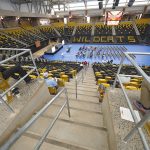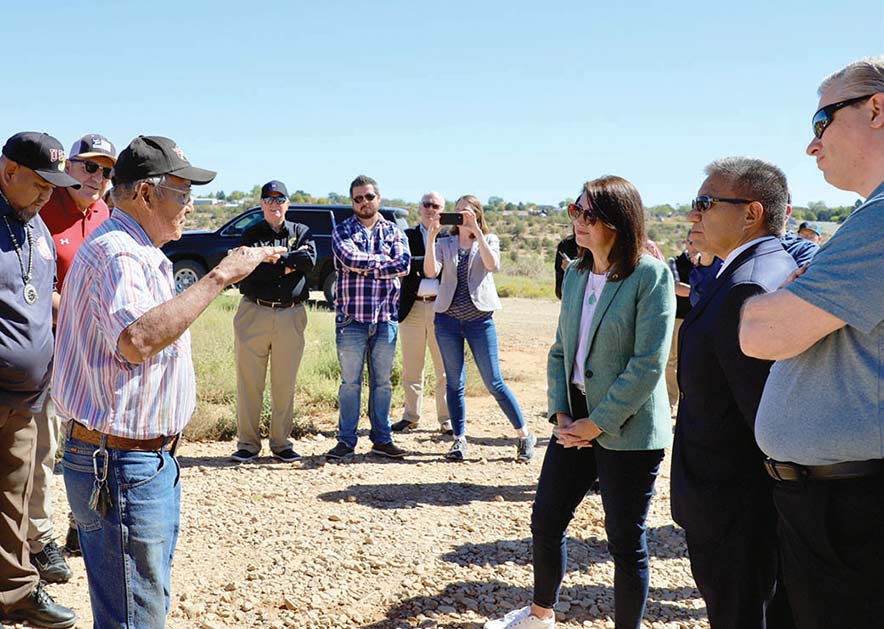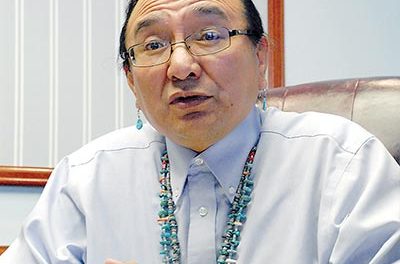
Capital Briefs: Talks continue over Westwater needs
BLANDING, Utah

Courtesy photo | President’s office
Westwater elder Albert Cly, left, talks with Utah Lt. Gov. Deidre Henderson, third from right, and Vice President Myron Lizer, second from right, during a visit by Utah officials to the Westwater suburb west of Blanding, Utah, on Sept. 22.
Discussions continue on how to provide 27 Navajo families living on 120 acres here with running water and electricity.
The president’s office reports that Vice President Myron Lizer met with Utah Lt. Gov. Deidre Henderson on Sept. 22.
The families live on the Westwater subdivision, a 120-acre plot on the west side of Blanding purchased by the Navajo Nation in 1986.
Also at the meeting were Utah Division of Indian Affairs Director Dustin Jansen, San Juan County Commissioner Bruce Adams and Blanding Mayor Joe Lyman.
Lizer said, “Within less than one mile away, Blanding residents enjoy running water and electricity and we are striving to make those basic necessities available to our Navajo people as well.”
In July, President Jonathan Nez also met with Henderson to discuss the same issue.
Henderson said, “Westwater residents are citizens of the state of Utah who deserve to have running water and electricity. They also deserve to have political leaders who can come together to finally solve this problem.”
The Utah Legislature approved $500,000 for the project.
The Church of Jesus Christ of Latter-day Saints also committed $500,000. The city of Blanding’s Utah Navajo Trust Fund and the Navajo Nation will make future contributions.
Renea Gene, a resident of Westwater, said, “As a mother, I want my children and grandchildren to experience the luxury of a warm shower and to charge their laptops and tablets for school.”
A total of 10 Utah legislators also attended the meeting.
Gold Star Families Day recognized
WINDOW ROCK – On Sunday, Navajo Nation leaders and veterans gathered at Veterans Memorial Park in Window Rock to honor the sacrifices of fallen warriors and their families on “Navajo Nation Gold Star Families Day.”
This was held in conjunction with National Gold Star Mother’s and Family Day.
Bobby Martin, with the Navajo Hopi Honor Riders, said, “Let us always remember and never forget the Gold Star Families of the brave servicemen and women who have paid the ultimate sacrifice for our country.”
Martin read the names of 14 fallen warriors who gave their lives in the line of duty since 2003, all while serving in Iraq.
They are: U.S. Army Spec. Lori Piestewa, Pvt. First Class Harry Shondee, Sgt. Lee Duane Todacheene, U.S. Marines Lance Corp. Quinn Keith, Lance Corp. Kevin Joyce, Army Corp. Lyle Cambridge, Sgt. Marshall Westbrook, Sgt. Clifton Yazzie, Sgt. Christopher Gonzalez, Sgt. Troy Tom, Marines Lance Corp. Alejandro Yazzie, Army Spec. Christopher Moon, Sgt. First Class James Thode, and Marines Staff Sgt. Jonathan Davis.
President Jonathan Nez said, “Today, we join the Navajo-Hopi Honor Riders to recognize these families with our deepest condolences and respect. To all the Gold Star Families, know that your child is always in our Nation’s heart.”
2022 budget signed into law
WINDOW ROCK – On Monday, President Jonathan Nez signed into law the Navajo Nation’s fiscal year 2022 budget, which includes full funding for veterans, prosecutors, and direct services for elders, youth, and community needs.
The Navajo Nation Council approved the budget by a vote of 18-3 on Sept. 10. It goes into effect on Oct. 1.
The three branch chiefs allocated approximately $177 million in General Funds for the three branches of government.
The budget provides funds for veterans in the five agencies to help provide direct services and assistance.
Nez, who saw a protest by veterans on Friday, said, “I am very thankful to our Navajo veterans, our warriors, for bringing forth their concerns to leadership last week. If there are any concerns with the budgets, we will sit down and talk through those issues with our veterans and Council members.”
The budget also approves full funding for the prosecutor’s office, which was the subject of another protest march on Sept. 17 by Diné Sáanii for Justice.
Nez said, “Perpetrators of crimes need to be held accountable for their actions, but we also need the support of the judicial branch once cases are moved forward from the Office of the Prosecutor.”
The budget also provides a three-percent pay raise for all Navajo Nation employees.
It also includes $2.6 million for needs such as new vans to help deliver meals and provide transportation for elders, operational costs for the courts, personnel and operating expenses for the public defender office, prosecutor’s office and Criminal Investigations.
Nez also used his line-item veto authority to strike $881,000 for the Department of Criminal Investigations because the department will receive approximately $1 million in carryover funds included in the budget. If there is a need for more money, Nez is open to discussing options.
He also removed $1.3 million for Capital Outlay Match funding., citing the need for an accounting of current fund balances.
Several conditions of appropriations were also removed, however, Nez said that he understands the needs and concerns and will work with the proper divisions and programs to address those matters.
Improvements to Many Farms, Tselani/Cottonwood roads completed
WINDOW ROCK – Improvements to Navajo Routes 8085 and 251, which serve Many Farms and Tselani/Cottonwood, Arizona, are complete, according to a news release from the president’s office.
In Many Farms, five miles of N8085 was improved and in Tselani/Cottonwood 15 miles of N251 was graded and work included signs and guardrails.
Delegate Kee Allen Begay Jr. said, “This is a blessing for the elders, youth and families in both communities. For years, I’ve heard the concerns for the safety of our people, and I am excited that many improvements were made through collaboration and hard work.”
Garret Silversmith, director of the Navajo Division of Transportation, said N8085 received funding from the Navajo Nation general funds and N251 was funded by the Tribal Transportation Improvement Program.
President Jonathan Nez said, “With the hard work and dedication from the residents and local chapter officials, the road improvements were identified and funded.
“The improvements help address safety concerns and improve access to school, work, health, and emergency responses,” he said.
Changes to radiation act introduced
WASHINGTON, D.C. – On Sept. 22, a bipartisan group of congresspeople re-introduced legislation to extend and expand eligibility under the Radiation Exposure Compensation Act.
Eligibility would include those who suffered from cancers and other diseases related to fallout from above-ground nuclear weapons testing during the Cold War period of the 1950s and 1960s.
The bill expands coverage to allow more victims, called “downwinders,” to file for compensation.
RECA, passed in 1990, limits compensation to people who lived in parts of Nevada, Utah, and Arizona at the time of the tests, despite studies showing radioactive fallout and radiation reached a number of states in the Mountain West.
The proposed RECA bill would provide coverage for additional forms of cancer, increase compensation from $50,000 to $150,000, and improve benefits for workers and tribal residents exposed to fallout.
President Jonathan Nez said, “Now is the time to ensure that this program reaches its full potential in remediating effects of radiation exposure on the Navajo people.”







 Highway 264,
Highway 264, I-40, WB @ Winslow
I-40, WB @ Winslow